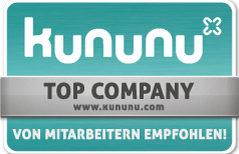#justasking our Head of Project Development, Oliver Merkert
Hello Oliver! Thank you very much for taking the time for a short interview. Could you give us a brief overview of your career path and what brought you to the position of Head of Project Development?
Oliver: My career began at PROMOS in 2001. A colleague from my degree programme introduced me to the company. I started as a student in the Consulting department, initially as an assistant, and prepared and conducted training courses. Nevertheless, I retained my passion for development, which I still cultivate today. in 2005, I became a permanent employee and officially switched to the Development department. After several years as a developer, I took on a team management role in software development in 2008 and worked my way up to Director Software Development by 2013. As Head of Project Development, I have been responsible for five teams with around 50 developers since 1 September 2024.
Which aspects of your role do you enjoy the most and why?
Oliver: What I enjoy most about PROMOS is the opportunity to shape the organisation, both in terms of content and the future. As part of the PROMOS2030 project, we have the opportunity to make the organisation fit for the future. I am proud to have been part of successful projects and appreciate the valuable collaboration with my colleagues. Even though I do less programming myself as Head of Project Development, I enjoy taking part in technical brainstorming sessions and workshops in order to find solutions together. The human element, the togetherness and the support within the team are also very important to me.
What are the biggest challenges you face in development and how do you deal with them?
Oliver: A constant challenge is the need for further training and adapting to new technologies. Our customers’ requirements are becoming increasingly complex and we have to proactively integrate new topics and technologies. Another challenge is resource management and task distribution. We often have more tasks than staff, so it’s crucial to set the right priorities and ensure that the right people take on the tasks. We frequently have to “reprioritise” in order to meet the needs of our customers, while at the same time maintaining continuity in the distribution of work within the team.
Could you give us an example of a particularly successful project you have worked on? What were the key factors for success?
Oliver: One example that comes to mind is the numerous SAP implementations that we have carried out in recent years. Here, it’s important that we respond flexibly to the individual needs of our customers. Successful collaboration between the various teams – from Sales to Project Management and Development – is essential. Every customer has their own priorities and it is our job to understand these and offer customised solutions. I’m proud of the fact that we have mastered many challenging projects as a team and have been able to achieve success together.
How do you promote collaboration and communication within your team?
Oliver: As “Head of”, my direct team are the team leaders. Internal communication is particularly important to us, which is why we have three fixed meetings a week in different constellations. At these meetings, we efficiently manage the processing of enquiries from the various areas, including customer enquiries. These sessions are the formal framework, but we also coordinate on personnel topics such as job applications. It’s essential that we work closely together to find suitable colleagues for our tasks. In addition, we discuss projects and critical situations in which reorganisations may be necessary. As we had already worked well together before, we didn’t need to set up a new team – we can continue working on our joint tasks straight away.
I am also currently in a transition phase in which I am both Head of and Team Leader. I have a team of 11 developers with whom I have a regular meeting every fortnight to discuss general topics. It is also important to me to have regular organisational meetings with each individual to discuss leave, project assignments and any personal issues that employees may bring with them.
We also try to strengthen team cohesion by organising cross-divisional team events. We recently had a cookery class where we created a multi-course menu together. It was exciting to see how the characters emerged in a different environment. During our “development breakfast”, for years there has been a good professional and private exchange between all participating developers in a relaxed atmosphere.
What qualities do you think are essential to lead an effective project team?
Oliver: The ability to come up with solutions independently, reliability, teamwork skills and (specialised) knowledge are essential.
What current trends do you see in project development and how do they influence your work?
Oliver: The trend really is moving towards more interfaces to other systems and cloud topics, especially with SAP. In the past, SAP® was often an isolated solution, but integration with other systems is increasing. The use of AI, such as in our co-pilot, is also an important factor. This enables us to clarify questions and discuss complex programming routes, which represents a new dimension of cooperation.
It’s exciting to see how AI supports us, but it doesn’t replace the developer. Our work remains highly specialised and we bring a great deal of expertise to the table, particularly when it comes to translating specialist requirements into technical concepts.
Why would you advise new talents to apply for a job at PROMOS?
Oliver: At PROMOS you can expect a great team spirit and the opportunity to become part of a larger team that also includes the areas of consulting, SAP Basis, support, marketing and sales. Even as a working student, you are not treated as a second-class employee. Everyone is welcomed and supported with seriousness and friendliness. The variety of topics is particularly exciting, and as a developer you can live out your potential in different areas and decide for yourself how deeply you want to immerse yourself in certain technologies.
It is important that you are not only given technical tasks that are overwhelming, but that you also have the opportunity to develop and take on responsibility. Hardly a week goes by without me learning something new, and that’s what makes the work here so varied.
Thank you very much for your insights, Oliver!
Oliver: My pleasure!


